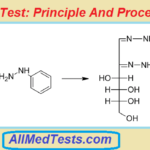We have been doing different determinations by Kinetic UV method on our website. Today, our objective is the Creatine Kinase Test by IFCC Kinetic Method. Creatine kinase is basically an enzyme which is mostly present in heart muscles and skeletal. The formation of this substance happens which two subunits which are from muscle and brain are associated with each other. If you see any increase in the CK then this results in many dangerous diseases involving muscles disease or even traumas. When we are talking about such dangerous measures, it becomes really important to estimate that substance. And this is when we use to do a test like IFCC Kinetic Method. In this article, we are going to do the estimation of creatine kinase enzyme by using IFCC Method. You will learn the principle, reagents, and the complete procedure for this method so let us begin now.
Learn the Estimation of LDH.

The Principle and Reagent for Creatine Kinase Test:
The first thing before we should discuss before we move on to perform the test is the principle of that particular test. First, we will discuss the principle of IFCC Kinetic method and then we will move to the reagent and then the procedure of the test.
The determination of subunit B is done by the immunoinhibition of both MM subunits and the M subunit of CK-MB. Then followed by some reactions we measure the correspondence of half CK-MB by observing and measuring the rate of absorbance. Then we use different formulas to estimate the final result. This IFCC Kinetic Method once understood you can easily perform the rest of the test. Then, of course, there is certain reagent which we use while we perform this test. Let us now study this reagent in detail and make our test easier.
The reagents used in this test are categorized as A and B. In the category A, we have different elements like Imidazole Buffer with PH of 6.7, N-acetyl cysteine, Magnesium Acetate, Glucose, NADP, and HK. There are present in the amounts of 100, 20, 10, 20, 2.5 mmol/L, and > 4 KU/L respectively. In the category, there are Creatinine Phosphate, AMP, ADP, and sufficient amount of human antibody. There is no need to prepare any reagent in the bioreagent and all the liquids are ready to use. In the Mono-reagent procedure, we will need to mix 1 part of B with the 4 parts of A and then we will be able to obtain the working reagent. These reagents, if not expired, remain stable at a temperature between 2-8oc. Once we have prepared the reagent, we are good to perform the estimation of CK by IFCC Kinetic method.
Recommended: Learn the estimation of SGOT By Kinetic UV Method.
Creatine Kinase Test Procedure:
The procedure is very easy to perform once we have understood the principle and have all the reagents. The ancillary equipment which we are going to need is Automatic pipettes, photometer, analysis cuvettes, water bath, and NACL solution. Our sample to perform this test will be serum in which we are going to determine creatine kinase enzyme. This sample remains stable at a temperature between 2-8 degrees and for 8 days at least. While we are doing the analytical procedure, the working temperature should be 37oc and a wavelength of 340.
- In the Bi-reagent process, the elements should be pipetted into the well-cleaned cuvettes and disposable cuvettes.
- After the above steps for the bioreagent procedure, mix all the reagents from B category. Then put them in the incubator for 2 minutes at least at a temperature of 37oc.
- Now, we will make the final observations and obtain the results with the given formulas for these tests.
Final Words:
So, this was the complete estimation of CK enzyme by IFCC Kinetic Method. If you have any question or feedback about this article then leave it in the comments section. Keep visiting All Med Tests for more interesting tests.






CK (Toyal)
Result units Reference Range
351.00 H u/l 0-200